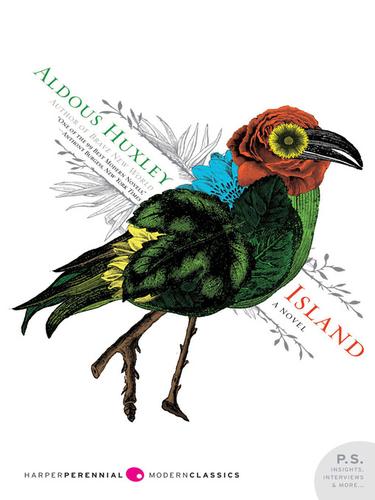ilk@bookrastinating.com (e)k Aldous Huxley(r)en Island liburuaren kritika egin du
Island
Pala is an island nation in South East Asia. It has engineered the ego out of human institutions, and over the course of 150 years the result is a state and society whose primary goal is generating fully realized, spiritually fulfilled human beings, as opposed to economic growth or military power - human beings as a genuine end instead of a means. Carefully managing a combination of Western scientific advances in medicine and sanitation with Buddhist ethics, it's largely avoided the repressions of capitalism and communism. What would a nation's social, cultural and economic architecture have to be like for this to happen? What kind of institutions would it possess? What foreign influences would it welcome or discard or completely invert to suit its aims?
We follow Will, a jaded English reporter who finds himself recovering in a Palanese hospital. Mobile again, he accepts a tour of the island, meeting …
Pala is an island nation in South East Asia. It has engineered the ego out of human institutions, and over the course of 150 years the result is a state and society whose primary goal is generating fully realized, spiritually fulfilled human beings, as opposed to economic growth or military power - human beings as a genuine end instead of a means. Carefully managing a combination of Western scientific advances in medicine and sanitation with Buddhist ethics, it's largely avoided the repressions of capitalism and communism. What would a nation's social, cultural and economic architecture have to be like for this to happen? What kind of institutions would it possess? What foreign influences would it welcome or discard or completely invert to suit its aims?
We follow Will, a jaded English reporter who finds himself recovering in a Palanese hospital. Mobile again, he accepts a tour of the island, meeting locals and the diplomat from the neighboring nation of Rendang. Everyone speaks English! And speak it well they should, for these dialogues make up the bulk of this philosophical book about how we might defang and repurpose the worst tendencies of human nature. This is an ideas novel, pure plot and character readers should look elsewhere.
Will's guides see the first world, Europe in particular, as a tangle of mass dysfunctions responsible for widespread generational trauma, psychoses and sociopathy among its populations, stemming from its social and economic organization, its religious baggage and its disciplinary insistence on treating mind and body as separate. It turns out Pala has alternatives (and alternative purposes) for all sorts of things - the nuclear family, state education, hallucinogenic drug use, physical activity. A coming-of-age custom, the Pre-Elementary Test, sees participants scale a high edifice with not much equipment than a rope ('An ordeal [...] which is the first stage of their initiation out of childhood into adolescence. An ordeal that helps them to understand the world they'll have to live in, helps them to realize the omnipresence of death'). Families exist in the context of Mutual Adoption Clubs ('Take twenty sexually satisfied couples and their offspring; add science, intuition and humor in equal quantities; steep in Tantrik Buddhism and simmer indefinitely in an open pan in the open air over a brisk flame of affection.' 'And what comes out of your open pan?' Will asked. 'An entirely different kind of family. Not exclusive, not predestined, not compulsory. An inclusive, unpredestined and voluntary family. Twenty pairs of fathers and mothers, eight or nine ex-fathers and ex-mothers, and forty or fifty children of all ages.')
Pala isn't powerful or materially wealthy either. It knows what it's given up to achieve the intangibles. There is no large scale industry ('Electricity minus heavy industry plus birth control equals democracy and plenty. Electricity plus heavy industry minus birth control equals misery, totalitarianism and war'). Because a low level of income inequality is socially reinforced, it hasn't got financiers or captains of industry. Politically it's too federated - across geographic, social and professional lines - for any Great Man of History ('Muscle People' as the Palanese call personalities like Stalin) to amass an unassailable power base.
It's not a book about capitalism versus communism. To come away with that assumption is to have misunderstood Huxley's concerns. It's about one British man of letters daring to wonder, as he witnessed the British Empire rapidly being dismantled, whether some corners of the world might have a go at incubating real civilization. It's definitely about endings of all sorts - the latter half is packed with Buddism. It's a highly unbalanced novel, even by the author's admission. But it's never boring.

